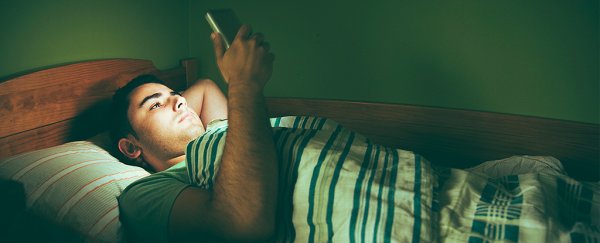Researchers have come up with five different types of insomnia – types that might help doctors personalise specific treatments in the future, making them more effective and better tailored towards each individual with sleep problems.
Contrary to what you might expect, these groupings aren't actually based on your typical sleep symptoms, such as trouble waking up or difficulty staying asleep.
Instead, these new types are linked to other factors - stress, emotions, personality traits, mood, and previous life events.
Applying labels Type 1 to Type 5, scientists showed how different people with insomnia had different cognitive characteristics, including levels of anxiety and emotional sensitivity. The study also showed participants tended to stay in the same type over time.
"While we have always considered insomnia to be one disorder, it actually represents five different disorders," says one of the researchers, Tessa Blanken from the Netherlands Institute for Neuroscience. "Underlying brain mechanisms may be very different."
"For comparison: progress in our understanding of dementia was propelled once we realised that there are different kinds, such as Alzheimer, vascular, and frontal-temporal dementia."
Data was gathered from around 2,224 individuals showing self-reported symptoms of insomnia. They were asked to fill in questionnaires about personality traits that we already know are linked to brain structure and function, and compared with a control group.
Type 1 individuals scored highly on distressing traits like neuroticism and feeling low, while those in the Type 2 and Type 3 groups both scored lower for distressing straits – though Type 2 respondents were generally more positive and content than Type 3.
Type 4 and Type 5 individuals reported lower levels of distress, but Type 4 folk tended to experience long-lasting insomnia after stressful life events, whereas this wasn't noticeable in Type 5 people.
In follow-up surveys taken five years later, the study participants were usually still in the same type group – an 87 percent probability, on average.
Knowing some of the traits behind a person's insomnia could help doctors come up with treatment that gets better results, the researchers say – Type 2 and Type 4 people had the most improvement in their sleep after taking benzodiazepine, for example.
The people in the Type 2 bracket also responded well to cognitive behavioural therapy, whereas the people in Type 4 didn't.
According to the team behind the work, people across all the different types had the same sort of insomnia symptoms, and it's here that previous attempts to split insomnia into different categories might have fallen down. Looking at the bigger picture could be a better way to split people up.
There are some limitations to talk about: firstly, these were individuals who reported insomnia symptoms, rather than people diagnosed with insomnia. Second, participation was voluntary, so it may not represent the population as a whole (just those who are happy filling out health questionnaires).
Nevertheless it's an interesting peek into how insomnia treatments might be improved in the future. Previous work has looked at some of the genetic risk factors for insomnia, another avenue for exploring more personalised treatments.
Around one in ten people are thought to suffer from chronic insomnia, and it's known for significantly increasing the risk of depression and other mental illnesses too. Any help we can get in fighting it is going to be welcome.
"Insomnia subtyping paves the way for studies that aim to prevent depression, resolve inconsistencies in and reduce heterogeneity of insomnia, and reveal differential causes of and develop better tailored personalised treatment for insomnia disorder," conclude the researchers.
The research has been published in The Lancet Psychiatry.
